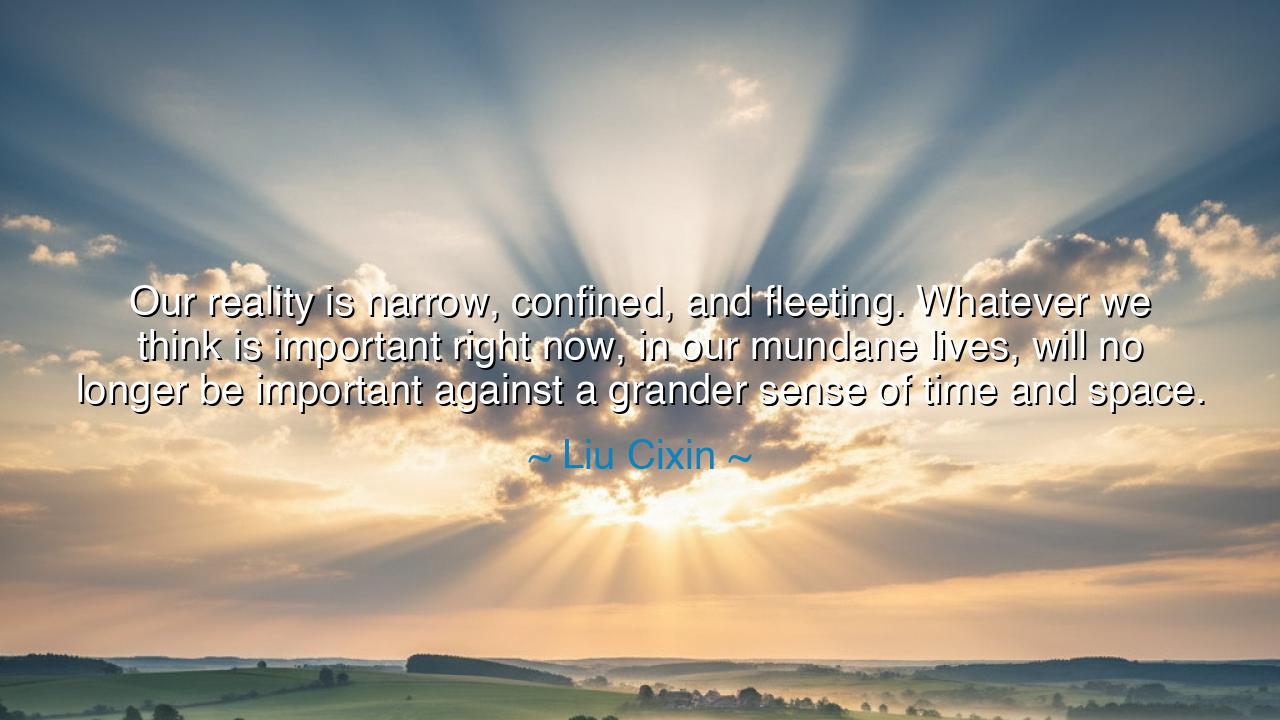
Our reality is narrow, confined, and fleeting. Whatever we think
Our reality is narrow, confined, and fleeting. Whatever we think is important right now, in our mundane lives, will no longer be important against a grander sense of time and space.






O seekers of wisdom, listen well to the words of Liu Cixin, a sage who, with great clarity, speaks of the nature of time, space, and the fleeting quality of human life: "Our reality is narrow, confined, and fleeting. Whatever we think is important right now, in our mundane lives, will no longer be important against a grander sense of time and space." These words invite us to step beyond the limitations of our everyday existence and recognize the vastness of the universe, where the trivial concerns that dominate our lives are but small ripples in an ocean of infinite time. We are but brief moments in the unfolding drama of existence, and what we deem important today may fade into obscurity tomorrow.
In the ancient world, the philosophers understood the fleeting nature of human life. Heraclitus famously said, "You cannot step into the same river twice," acknowledging the constant flow of time and the impermanence of all things. Similarly, Socrates taught that knowledge and the pursuit of virtue were the true path to wisdom, for everything else—wealth, fame, and power—was fleeting. He understood that what we see as significant in the moment will ultimately be lost to the great march of time. Liu Cixin’s words echo this timeless wisdom, reminding us that the things we hold dear today—our worries, our ambitions, our strivings—are only important against the narrow backdrop of our own limited perceptions.
Consider, O children, the grand story of Alexander the Great, whose name is known throughout the world. In his short life, Alexander sought to conquer the known world, amassing an empire that stretched from Greece to India. His ambition was enormous, his sense of destiny all-consuming. And yet, after his untimely death at the age of 32, his empire crumbled, and the world he had once sought to dominate moved on without him. What was once seen as his greatest accomplishment—the creation of his empire—became, in the vast expanse of history, just another fleeting moment. The magnitude of his actions, while significant in his time, faded against the larger course of human events. Liu Cixin’s words remind us of this very truth—that even the most powerful empires and individuals are but fleeting blips in the grand timeline of the universe.
The lesson of Liu Cixin is not one of nihilism, nor is it a call to abandon all concerns for the present. Rather, it is a reminder that our perceptions of importance are often too narrow, too confined by the limits of our own time-bound existence. We become trapped in our immediate worries and struggles, believing that the small troubles of the day are the most important things we face. But when we step back and view the world from a larger perspective—one that takes into account the vastness of time, the endless expanses of space, and the eternal dance of the stars—we come to realize that our smallness in the universe is not a cause for despair, but for humility. It is in this humility that we can begin to see what truly matters.
Consider the story of the Eiffel Tower, that grand structure that defines the skyline of Paris. When it was first built in the late 19th century, many people derided it as an eyesore, a monstrosity that threatened to tarnish the beauty of the city. In its early days, it was seen as temporary, something that might one day be torn down. Yet today, it stands as one of the most beloved monuments in the world, a symbol not just of France but of human ingenuity. But what will the Eiffel Tower mean in a thousand years, or in a hundred thousand years? Will it still stand? Or will it, like the empires of old, eventually fall to the weight of time? Liu Cixin challenges us to consider these questions—not to dismiss the things we create or value, but to understand their impermanence and place them within the larger context of time and space.
O children, the lesson to take from this is not that everything is unimportant, but that the things we consider most significant today—our possessions, our status, our fleeting ambitions—must be viewed through the lens of something much greater. We are part of a universe far grander than we can fully understand. The world will continue to turn long after our individual lives have ended, and the things we hold dear will eventually fade. Therefore, we must ask ourselves: what truly matters? Is it the fleeting concerns of the moment, or is it the lasting legacy of the things we do that touch the hearts of others, that contribute to the greater good?
So, O seekers, let this wisdom guide you: take the time to step back from the small concerns that fill your day and see them in the context of a grand and eternal universe. While the present moment is important, do not become enslaved by it. Instead, focus on what can leave a lasting mark—on love, on wisdom, and on the pursuit of truth. Live not just for today, but for the future, and consider how your actions will resonate across the vast river of time. Recognize the fleeting nature of existence, and let it inspire you to live with purpose, to seek a greater understanding of what truly matters, and to leave a legacy that endures, however small, in the ever-expanding story of the universe.






AAdministratorAdministrator
Welcome, honored guests. Please leave a comment, we will respond soon